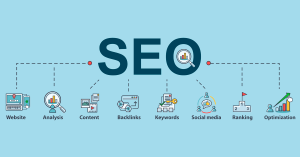Post Views: 195
Information, e-commerce, advertising, and entertainment are all readily available on the internet. It’s true you search for them, but how exactly do you find them? This article explains how search engines work and how SEO can help your business.
Search Engine Optimization (SEO)
As a digital marketer, knowing how to get your brand, website, or company found by searchers is a core skill, and understanding how SEO is evolving will keep you at the top of your game.Technical Optimization
Completing activities on your site that improve SEO but are not related to content. It often happens behind the scenes.On-Page Optimization
The process of ensuring the content on your site is relevant and provides a great user experience. Using a content management system, you can then target the right keywords within your content. Common examples of content management systems include WordPress, Wix, Drupal, Joomla, Magento, Shopify, and Expression Engine.Off-Page Optimization
A process of improving your site’s search engine rankings outside your website. Link building is a crucial part of building a site’s reputation, which is largely driven by backlinks. However, while SEO changes frequently in small ways, its key principles do not. We can break SEO into three components:What Happens While Searching?
Search engine algorithms are computer programs that look for clues to give the searcher the exact results they are looking for. Search engines rely on algorithms to find web pages and decide which ones to rank for any given keyword. There are three steps to how search engines work:1. Crawling
This refers to a search engine’s ability to send out “crawlers” to discover new pages based on the website’s themes and topics. Also, check previously discovered pages to see if there have been any updates or changes made.2. Indexing
When the crawlers have concluded their search, they will index a website based on its evaluation. Then registration will then store the website within its database, linking it to certain topics. A web page may not be indexed if:- Not mobile-friendly
- Content is considered duplicate
- Content is considered low value or spammy
- Couldn’t be crawled
- Page or domain lacked inbound links
3. Ranking
For any given keyword, search engines sort or rank the results to give the searcher the most useful and relevant results they can find. There are more than 200 ranking signals that search engines use to sort and rank content, and they all fit under the three pillars of SEO: technical optimization, on-page optimization, and off-page optimization. Some examples of signals that search engines use to rank web pages are keyword presence in the title tag, the loading speed of the web page, and website reputation.How Search Engines Work FAQs
How do search engines work in finding and ranking web pages?
Search engines work by using complex algorithms to crawl, index, and rank pages. They send out “crawlers” or “spiders” to explore the internet, gathering information about the content on websites. The pages are then indexed, and when a user enters a search query, the search engine’s algorithm ranks relevant pages based on factors like relevance, authority, and user experience.What is the role of keywords in search engine rankings?
Keywords play a crucial role in search engine rankings. When a user searches for specific terms, search engines match those keywords with indexed pages’ content. Pages containing relevant and optimized keywords are more likely to rank higher in search results.Can search engines understand and index all types of website content?
Search engines have become increasingly adept at understanding various types of website content, including text, images, videos, and even certain interactive elements like forms and JavaScript. However, it’s crucial to optimize content properly, use descriptive alt text for images, and provide clear navigation for optimal indexing. Looking to get your small business ranked higher but don’t know where to start? Let the SEO experts at WJ Media Group help improve your sites rankings through our SEO services for small businesses in New Jersey.Related Articles
The Importance of Search Engine Optimization (SEO) for Small Businesses
Post Views: 256 Understanding the importance of SEO for Small...
Read MoreCannabis Marketing & SEO in 2022
Post Views: 186 Organic Traffic is Your Best Friend Paid...
Read More15 SEO Benefits You Need to Know
Post Views: 240
Read MoreWhat is SEO?
Post Views: 346 SEO stands for “search engine optimization.” It’s...
Read More




